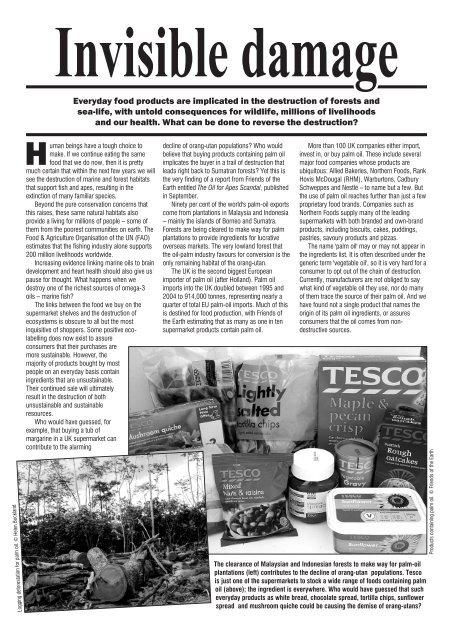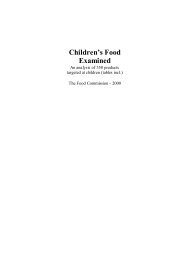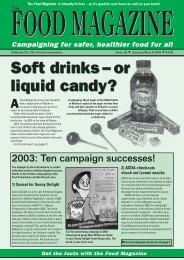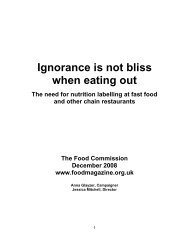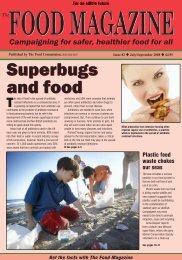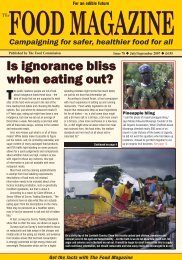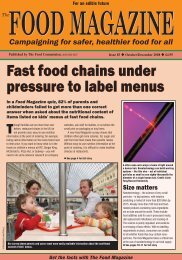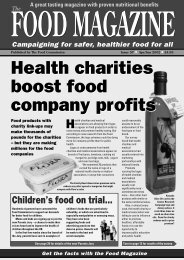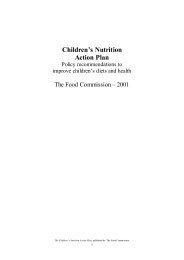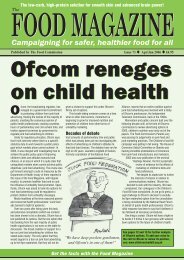Food Magazine - The Food Commission
Food Magazine - The Food Commission
Food Magazine - The Food Commission
Create successful ePaper yourself
Turn your PDF publications into a flip-book with our unique Google optimized e-Paper software.
Invisible damage<br />
Everyday food products are implicated in the destruction of forests and<br />
sea-life, with untold consequences for wildlife, millions of livelihoods<br />
and our health. What can be done to reverse the destruction<br />
Human beings have a tough choice to<br />
make. If we continue eating the same<br />
food that we do now, then it is pretty<br />
much certain that within the next few years we will<br />
see the destruction of marine and forest habitats<br />
that support fish and apes, resulting in the<br />
extinction of many familiar species.<br />
Beyond the pure conservation concerns that<br />
this raises, these same natural habitats also<br />
provide a living for millions of people – some of<br />
them from the poorest communities on earth. <strong>The</strong><br />
<strong>Food</strong> & Agriculture Organisation of the UN (FAO)<br />
estimates that the fishing industry alone supports<br />
200 million livelihoods worldwide.<br />
Increasing evidence linking marine oils to brain<br />
development and heart health should also give us<br />
pause for thought. What happens when we<br />
destroy one of the richest sources of omega-3<br />
oils – marine fish<br />
<strong>The</strong> links between the food we buy on the<br />
supermarket shelves and the destruction of<br />
ecosystems is obscure to all but the most<br />
inquisitive of shoppers. Some positive ecolabelling<br />
does now exist to assure<br />
consumers that their purchases are<br />
more sustainable. However, the<br />
majority of products bought by most<br />
people on an everyday basis contain<br />
ingredients that are unsustainable.<br />
<strong>The</strong>ir continued sale will ultimately<br />
result in the destruction of both<br />
unsustainable and sustainable<br />
resources.<br />
Who would have guessed, for<br />
example, that buying a tub of<br />
margarine in a UK supermarket can<br />
contribute to the alarming<br />
decline of orang-utan populations Who would<br />
believe that buying products containing palm oil<br />
implicates the buyer in a trail of destruction that<br />
leads right back to Sumatran forests Yet this is<br />
the very finding of a report from Friends of the<br />
Earth entitled <strong>The</strong> Oil for Apes Scandal, published<br />
in September.<br />
Ninety per cent of the world's palm-oil exports<br />
come from plantations in Malaysia and Indonesia<br />
– mainly the islands of Borneo and Sumatra.<br />
Forests are being cleared to make way for palm<br />
plantations to provide ingredients for lucrative<br />
overseas markets. <strong>The</strong> very lowland forest that<br />
the oil-palm industry favours for conversion is the<br />
only remaining habitat of the orang-utan.<br />
<strong>The</strong> UK is the second biggest European<br />
importer of palm oil (after Holland). Palm oil<br />
imports into the UK doubled between 1995 and<br />
2004 to 914,000 tonnes, representing nearly a<br />
quarter of total EU palm-oil imports. Much of this<br />
is destined for food production, with Friends of<br />
the Earth estimating that as many as one in ten<br />
supermarket products contain palm oil.<br />
More than 100 UK companies either import,<br />
invest in, or buy palm oil. <strong>The</strong>se include several<br />
major food companies whose products are<br />
ubiquitous: Allied Bakeries, Northern <strong>Food</strong>s, Rank<br />
Hovis McDougal (RHM), Warburtons, Cadbury<br />
Schweppes and Nestlé – to name but a few. But<br />
the use of palm oil reaches further than just a few<br />
proprietary food brands. Companies such as<br />
Northern <strong>Food</strong>s supply many of the leading<br />
supermarkets with both branded and own-brand<br />
products, including biscuits, cakes, puddings,<br />
pastries, savoury products and pizzas.<br />
<strong>The</strong> name 'palm oil' may or may not appear in<br />
the ingredients list. It is often described under the<br />
generic term 'vegetable oil', so it is very hard for a<br />
consumer to opt out of the chain of destruction.<br />
Currently, manufacturers are not obliged to say<br />
what kind of vegetable oil they use, nor do many<br />
of them trace the source of their palm oil. And we<br />
have found not a single product that names the<br />
origin of its palm oil ingredients, or assures<br />
consumers that the oil comes from nondestructive<br />
sources.<br />
Products containing palm oil. © Friends of the Earth<br />
Logging deforestation for palm oil. © Helen Buckland<br />
<strong>The</strong> clearance of Malaysian and Indonesian forests to make way for palm-oil<br />
plantations (left) contributes to the decline of orang-utan populations. Tesco<br />
is just one of the supermarkets to stock a wide range of foods containing palm<br />
oil (above); the ingredient is everywhere. Who would have guessed that such<br />
everyday products as white bread, chocolate spread, tortilla chips, sunflower<br />
spread and mushroom quiche could be causing the demise of orang-utans


